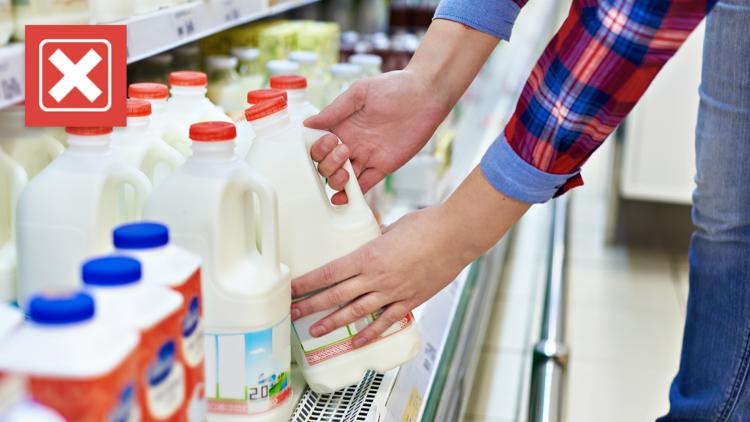Highly Pathogenic Avian Influenza, also known as bird flu, is a highly contagious virus that affects poultry and cattle. A new strain of the virus, H5N1, is widespread worldwide, it’s been detected in 33 herds of cattle across eight states in the U.S.
The Food and Drug Administration recently announced that they found evidence of bird flu in milk that was being sold in stores. Recent internet search trends show people are searching for any milk recalls as a result of the findings.
THE QUESTION
Is there a milk recall related to the bird flu outbreak?
THE SOURCES
- Food and Drug Administration
- United States Department of Agriculture
- Matt Herrick, International Dairy Foods Association spokesperson
- Scott Roberts, M.D., in a Yale New Haven Health article
THE ANSWER
No, there is not a milk recall related to the bird flu outbreak.
WHAT WE FOUND
There is not a milk recall related to the bird flu outbreak. Both the Food and Drug Administration (FDA) and the United States Department of Agriculture (USDA) say store-bought, pasteurized milk is still safe to drink.
“Based on the information and research available to us at this time, a milk recall is not necessary,” the USDA says.
Store-bought milk is considered safe due to the pasteurization process, which is required for any milk sold commercially.
“There's little risk of transmission in eggs and milk because you need to have direct contact with the infected animal itself. But more than that, the pasteurization process would kill any viable virus in there,” Scott Roberts, M.D., says in a Yale New Haven Health article.
To be pasteurized, raw milk is heated up to a temperature that causes any bacteria to be killed.
“Based on available information, pasteurization is likely to inactivate the virus, however the process is not expected to remove the presence of viral particles,” the FDA says. This means that remnants of the bird flu virus can still be detected in pasteurized milk, but it won’t infect whoever drinks it.
Matt Herrick, a spokesperson for the International Dairy Foods Association told the Associated Press that time and temperature regulations for pasteurization ensure the safety of the milk supply. Remains of the virus “have zero impact on human health,” Herrick told the Associated Press.
The FDA detected bird flu in pasteurized milk using quantitative polymerase chain reaction (qPCR) testing. The administration explains that more testing must be done to fully understand the initial findings.
Currently, the FDA is conducting additional “egg inoculation tests, a gold-standard for determining viable virus,” but say they have not seen anything to change their “assessment that the commercial milk supply is safe.”
The Associated Press contributed to this report.



